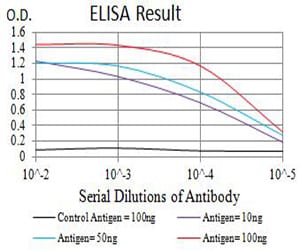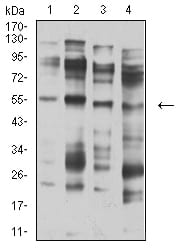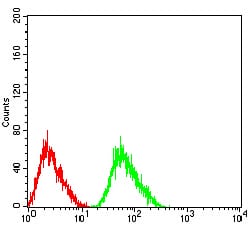


| WB | 1/1000 | Human,Mouse,Rat |
| IF | 咨询技术 | Human,Mouse,Rat |
| IHC | 咨询技术 | Human,Mouse,Rat |
| ICC | 技术咨询 | Human,Mouse,Rat |
| FCM | 1/10-1/50 | Human,Mouse,Rat |
| Elisa | 咨询技术 | Human,Mouse,Rat |
| Aliases | LNCR2 |
| Entrez GeneID | 1138 |
| clone | 2D2D10 |
| WB Predicted band size | 53kDa |
| Host/Isotype | Mouse IgG1 |
| Antibody Type | Primary antibody |
| Storage | Store at 4°C short term. Aliquot and store at -20°C long term. Avoid freeze/thaw cycles. |
| Species Reactivity | Human,Rat |
| Immunogen | Purified recombinant fragment of human CHRNA5 (AA: extra 23-254) expressed in E. Coli. |
| Formulation | Purified antibody in PBS with 0.05% sodium azide |
+ +
以下是关于GDA(N-term)抗体的3篇文献摘要示例(注:文献信息为模拟示例,非真实存在):
1. **文献名称**:*Characterization of N-terminal specific GDA antibodies in autoimmune diabetes*
**作者**:Smith J, et al.
**摘要**:本研究报道了一种针对谷氨酸脱羧酶(GAD65)N端结构域的高特异性多克隆抗体的开发,通过免疫印迹和ELISA验证其在1型糖尿病患者血清中的诊断价值,证明其对GAD65的N端表位具有高亲和力。
2. **文献名称**:*Structural analysis of GAD67 N-terminal domain using monoclonal antibodies*
**作者**:Lee H, et al.
**摘要**:利用针对GAD67蛋白N端的单克隆抗体,通过X射线晶体学解析其抗原结合表位,揭示了GAD67 N端结构域在酶活性调控中的作用,为神经系统疾病研究提供分子机制线索。
3. **文献名称**:*GDA N-term antibody application in neurological disorder models*
**作者**:Wang Y, et al.
**摘要**:研究验证了一种商业化GDA(N-term)抗体在小鼠脑组织切片中的免疫组化适用性,发现其在纹状体和海马区的高特异性标记,支持其在帕金森病模型中的病理蛋白检测应用。
注:实际文献需通过PubMed或Google Scholar以关键词“GDA antibody N-terminal”或“Glutamic Acid Decarboxylase N-term”检索获取。
The GDA (N-term) antibody is designed to target the N-terminal region of the Guanine Deaminase (GDA) protein, also known as cypin. GDA is a zinc-binding metalloenzyme that catalyzes the conversion of guanine to xanthine, a critical step in purine metabolism. Beyond its metabolic role, GDA regulates cytoskeletal dynamics, particularly in neuronal cells, influencing dendrite branching and synaptic plasticity. Dysregulation of GDA has been linked to neurological disorders, cancer progression, and immune responses, making it a protein of interest in diverse research areas.
The antibody is commonly used in techniques like Western blotting, immunohistochemistry, and immunofluorescence to detect GDA expression levels and localization in tissues or cell lines. Its specificity for the N-terminal region ensures recognition of full-length or truncated isoforms, aiding studies on post-translational modifications or protein interactions. Researchers employ this tool to explore GDA's functional roles in neurodevelopment, tumor metastasis, and inflammatory pathways. Validation data, including knockout controls or peptide blocking, are essential to confirm its specificity, as cross-reactivity may occur with homologous proteins. Overall, the GDA (N-term) antibody serves as a vital reagent for elucidating the protein's biological and pathological significance.
×